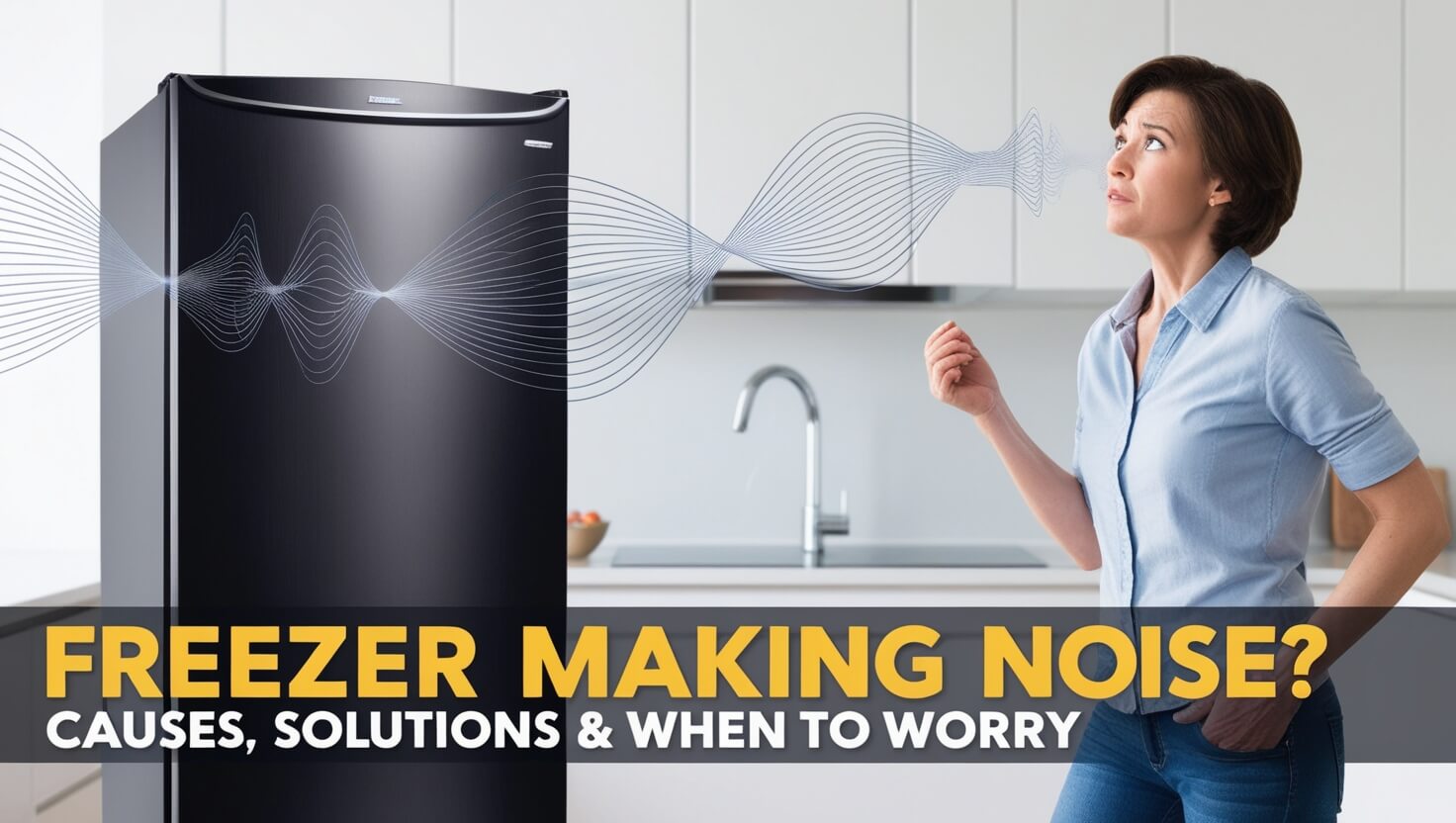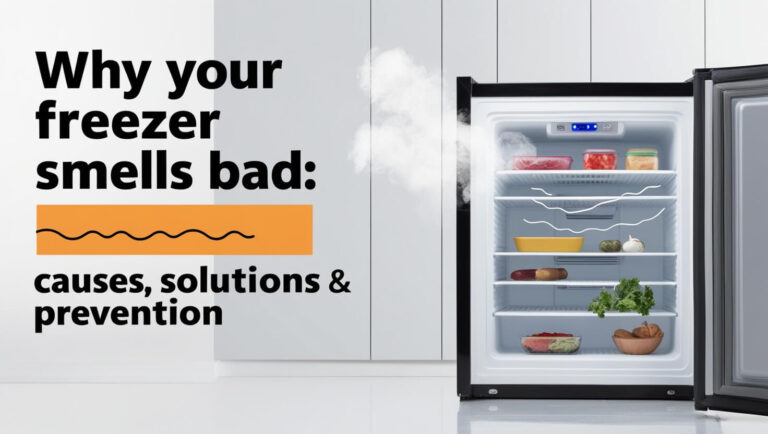
Is your freezer making strange noises? Don’t panic yet. Freezers can be noisy for many reasons – some harmless, others not so much. Freezer noises range from normal hums to signs of serious problems. This article helps you figure out what’s causing the racket and what to do about it. You’ll learn which sounds are okay, how to fix common issues, and when to get expert help.
Normal Freezer Sounds
Before you panic about your chatty freezer, it’s important to know that some sounds are perfectly normal. Let’s break down the common noises you might hear from a healthy freezer.
Common Operational Noises
Your freezer isn’t just a silent box of cold. It’s a machine with moving parts, and those parts make noise. Here are some sounds you can expect:
- Humming: This is the compressor working to keep things cool.
- Clicking: Often heard when the compressor turns on and off.
- Whooshing or gurgling: This is the sound of refrigerant flowing through the system.
- Cracking or popping: These noises happen as materials expand and contract with temperature changes.
Distinguishing Between Normal and Abnormal Sounds
So how do you know when a sound spells trouble? Here’s a quick guide:
Normal sounds are usually:
- Soft and rhythmic
- Consistent over time
- Short-lived (like a quick click or pop)
Abnormal sounds tend to be:
- Loud or harsh
- Persistent or getting worse
- Accompanied by poor freezer performance
If your freezer’s symphony falls into the second category, it’s time to investigate further.
Common Causes of Noisy Freezers
When your freezer starts making unusual noises, several culprits could be to blame. Let’s explore the most common reasons behind a noisy freezer.
Compressor Issues
The compressor is the heart of your freezer’s cooling system. If it’s acting up, you might hear:
- Loud humming or buzzing
- Clicking that doesn’t stop
- Knocking or banging sounds
These noises often mean the compressor is struggling to start or run properly. It could be due to wear and tear, electrical problems, or the compressor nearing the end of its life.
Fan Problems (Evaporator and Condenser)
Freezers typically have two fans: the evaporator fan inside and the condenser fan underneath. Fan issues can cause:
- Squealing or squeaking
- Rattling or vibrating
- Loud humming when the freezer door is opened
These sounds might indicate a loose or damaged fan blade, a worn-out motor, or something obstructing the fan’s movement.
Ice Buildup and Defrost System Malfunctions
Excessive ice in your freezer isn’t just annoying – it can be noisy too. Problems with ice can lead to:
- Crackling or sizzling sounds (during the defrost cycle)
- Loud pops or cracks
- Gurgling noises as melted ice drains
These noises often point to issues with the defrost system or poor door seals allowing moisture inside.
Loose or Vibrating Parts
Sometimes, the noise isn’t from a major component but from smaller parts that have come loose. This can cause:
- Rattling or vibrating
- Buzzing that changes when you touch the freezer
- Clicking or tapping sounds
These noises might be from loose screws, a wobbly fan, or even the freezer itself not being level on the floor.
Troubleshooting a Noisy Freezer
Now that we’ve covered the potential noisemakers, let’s roll up our sleeves and figure out what’s going on with your freezer.
Initial Inspection Steps
Before diving into specific components, start with these basic checks:
- Ensure the freezer is level. Use a spirit level to check, and adjust the feet if necessary.
- Check that nothing is touching the back or sides of the freezer.
- Listen carefully to pinpoint where the noise is coming from.
- Look for any visible damage or loose parts.
Checking the Compressor
The compressor is usually located at the back of the freezer. Here’s how to check it:
- Unplug the freezer for safety.
- Locate the compressor (it looks like a black tank).
- Gently wiggle it to see if it’s loose.
- Check for any oil leaks around the compressor.
- If you’re comfortable, use a multimeter to test for electrical continuity.
Remember, compressor repairs often require professional help.
Examining Fan Components
For fan issues:
- Unplug the freezer and remove the appropriate panels.
- Check if the fan blades spin freely.
- Look for any obstructions like ice or food packages.
- Inspect the fan blades for damage.
- Listen for any grinding noises when you manually spin the fan.
Investigating Ice Buildup
Excessive ice can cause all sorts of noises. Here’s how to check:
- Empty your freezer.
- Look for ice buildup on the back wall or around the evaporator coils.
- Check the door seals for any gaps or damage.
- Ensure the defrost drain isn’t clogged, which can lead to ice buildup.
Inspecting for Loose Parts
To track down rattles and buzzes:
- Remove all items from the freezer.
- Gently press on different areas while it’s running to see if the noise changes.
- Check all visible screws and tighten any that are loose.
- Inspect the drain pan underneath the freezer to ensure it’s secure.
DIY Solutions for Noisy Freezers
Sometimes, a little DIY can quiet your noisy freezer. Here are some fixes you can try at home.
Cleaning and Maintenance Tips
Regular cleaning can prevent many noise issues:
- Vacuum the condenser coils (usually found at the back or underneath) every 6 months.
- Clean the fan blades with a soft brush to remove dust and debris.
- Wipe down door seals and apply a thin layer of petroleum jelly to keep them supple.
- Clear any ice buildup manually (never use sharp objects that could damage the freezer).
Adjusting and Leveling Your Freezer
An uneven freezer can cause vibrations and noise:
- Use a spirit level to check if your freezer is balanced.
- Adjust the legs or add shims under the corners to level it out.
- Ensure there’s a small gap between the freezer and nearby surfaces to reduce vibrations.
Simple Repairs You Can Do at Home
For the DIY-inclined, here are some repairs you might tackle:
- Replace a noisy evaporator fan motor (if you’re comfortable with basic tools).
- Lubricate fan motors with a few drops of oil in the bearing.
- Tighten any loose screws or brackets you find.
- Replace worn door seals to prevent ice buildup and related noises.
Always unplug the freezer before attempting any repairs, and don’t hesitate to call a pro if you’re unsure.
When to Call a Professional
While DIY solutions can fix many issues, some problems require expert hands. Here’s when to pick up the phone.
Signs of Serious Freezer Problems
Call a technician if you notice:
- Electrical burning smells
- The freezer not cooling properly despite your efforts
- Loud, persistent noises that you can’t identify or fix
- Water leaking from the freezer
- The compressor running constantly without shutting off
These symptoms could indicate more serious issues that need professional attention.
Risks of DIY Repairs
While it’s tempting to fix everything yourself, some repairs carry risks:
- Electrical shock from mishandling wiring
- Damage to critical components like the compressor
- Refrigerant leaks, which are harmful to the environment
- Voiding your warranty with unauthorized repairs
When in doubt, it’s safer and often more cost-effective in the long run to call a pro.
Choosing a Qualified Appliance Technician
To find a good technician:
- Look for certified professionals with experience in freezer repair.
- Check online reviews and ask for recommendations from friends.
- Get multiple quotes to ensure fair pricing.
- Ask about warranties on parts and labor.
- Ensure they’re insured and bonded for your protection.
A skilled technician can diagnose and fix problems quickly, potentially saving you money and headaches.
Preventing Freezer Noise Issues
An ounce of prevention is worth a pound of cure, especially when it comes to keeping your freezer quiet.
Regular Maintenance Schedule
Stick to this simple maintenance routine:
- Clean condenser coils every 6 months
- Check and clean door seals monthly
- Defrost manual freezers when ice buildup exceeds 1/4 inch
- Inspect for unusual noises or performance changes weekly
Proper Usage and Care Tips
To keep your freezer running smoothly:
- Don’t overload it – allow air to circulate
- Keep the freezer at least 2/3 full for optimal efficiency
- Avoid opening the door frequently or for long periods
- Let hot foods cool before freezing to reduce moisture buildup
- Organize items to minimize searching time with the door open
Upgrading to a Quieter Freezer Model
If your old freezer is consistently noisy despite maintenance:
- Consider energy-efficient models with improved insulation
- Look for freezers with noise ratings under 40 decibels
- Chest freezers are often quieter than upright models
- Invest in a model with advanced compressor technology for quieter operation
While a new freezer is an investment, it can save money on energy bills and repairs in the long run.
Frequently Asked Questions About Noisy Freezers
Let’s address some common questions about freezer noises.
Is a humming freezer normal?
A soft, consistent hum is usually normal. It’s the sound of the compressor working. However, if the humming becomes loud or irregular, it might indicate a problem.
How often should I defrost my freezer?
For manual defrost freezers, defrost when ice buildup reaches 1/4 inch. Most modern frost-free freezers don’t need manual defrosting, but if you notice excessive frost, it might indicate a problem with the auto-defrost system.
Can a noisy freezer affect its cooling efficiency?
Yes, a noisy freezer can sometimes indicate issues that affect cooling. For example, a faulty fan can lead to uneven cooling, while a struggling compressor might not maintain proper temperatures.






